- Home
- Dan Millman
The Journeys of Socrates: An Adventure Page 2
The Journeys of Socrates: An Adventure Read online
Page 2
A few hours later he sat against a sack of potatoes as a farmer’s cart bumped up the narrow, muddy roads rutted with wagon tracks, pockmarked by the hooves of horses and oxen, then on foot to the school on the shore of Lake Krugloye in the hills north of Moscow.
As he hiked down into the valley, Heschel thought of the many letters he had written over the past five years and the same number of refusals he’d received. Several weeks before, he had sent a final letter to Chief Instructor Vladimir Ivanov: “I have not seen Sergei since he was taken to the school. My wife has died. I have no one left. This may be my last chance to see my grandson.”
When Ivanov’s letter had arrived, allowing the visit, Heschel had left immediately.
Now, chilled by the snow-laden wind on his neck, he lifted the collar of his wool coat. Two days, he thought—such a short time to pour my life into an eight-year-old boy. Then the words of Rabbi Hillel came into his mind: “Children are not vessels to be filled but candles to be lit.”
“I don’t have much fire left,” Heschel murmured aloud as he wove his way through birch and pine, down the cold and rocky grade dusted with snowflakes. His painful joints reminded him of his corporeal existence—and this one final errand. The sound of wind faded as Heschel’s mind slipped back into the crevices of memory, taking him back five years to the day a young soldier came to their door with a letter from Sergei’s father, instructing that his son should be taken to the Nevskiy Military School…
An hour later Heschel approached the main gate of the school and surveyed the enclosure, bordered like a castle with walls about four meters high. Just ahead he could see a spartan complex of blockhouses. No hedges or adornment softened the stone battlements, where, he surmised, efficiency and function molded the young soldiers’ lives.
A cadet showed Heschel across the large courtyard into the main building and down a long hallway to a door and sign that read, V. I. Ivanov, Chief Instructor.
He removed his cap, brushed back his thinning hair, and entered.
Part One
THE BITTER
AND
THE SWEET
I have a sad story to tell, and a happy one. In the end, you may find that they are one and the same, for the bitter and the sweet each has its season, alternating like day and night, even now, as I pass through the twilight hours…
FROM SOCRATES’ JOURNAL
.1.
SERGEI WAS WORRIED, that October day, when he was summoned to his uncle’s office. Being summoned—a rare event for any young cadet—usually meant bad news or punishment. So, in no hurry to stand before the chief instructor’s stern face and down turned brows, Sergei wandered across the school compound at a distinctly unmilitary pace.
He was supposed to think of Vladimir Ivanov not as his uncle but as Chief Instructor. He also was not supposed to ask personal questions, though he had many—about his parents and about his past. The chief instructor had said little about either one, except on that day four years ago when he’d announced that Sergei’s father had died.
Each spot Sergei passed in the inner courtyard held memories of earlier years: the first time he’d ridden a horse, bouncing wildly, clinging to the reins in a death grip…one of many fistfights he’d gotten into due to a quick temper, then lost due to his frail disposition.
He passed the infirmary and the small apartment of Galina, the elderly school nurse, who had watched over him when he’d first arrived. She had wiped his nose when he was sick and brought him to meals until he found his own way around. Too young to live in a barrack, he had slept on a cot just off the infirmary wing until he was five. It was a lonely time, with no place of his own and nowhere he fit in. The cadets treated him like a mascot or pet dog—petted one day, beaten the next.
Most of the other boys had mothers or fathers at home; Sergei had only his uncle, so he worked hard to please the chief instructor. His efforts, however, only earned the wrath of the older cadets, who called him “Uncle’s Vlad’s boy.” They would trip, push, or punch him at every opportunity—a moment’s inattention might mean bruises or worse. Older cadets routinely bullied the younger ones, and physical beatings were commonplace. The instructors knew about it but looked the other way unless someone was seriously injured. They tolerated the fights because it spurred the younger boys to toughen up and stay alert. It was, after all, a military school.
The first time Sergei was accosted by an older cadet, over in the corner of the compound, he started swinging wildly, sensing that if he backed down there would be no end to it. The older boy gave him a good beating, but Sergei managed to get in one or two good punches, and the boy never bothered him after that. Another time he had come upon two cadets beating a new boy. Sergei had attacked them with more rage than skill. They had backed off, treating the whole thing like a joke. But it was no joke to the new boy, whose name was Andrei and who had been Sergei’s only real friend ever since.
Just after his fifth birthday, Sergei was moved into a barrack with the seven-to ten-year-olds. Older boys lived upstairs, and anyone over sixteen lived in another building. The older boys ruled the barracks. Every cadet dreaded a move to the next floor, where he again would be the youngest and therefore the prey. Meanwhile, Sergei and Andrei watched each other’s backs.
Of the years prior to his arrival, Sergei had only hazy impressions—as if he had been cocooned in another world, not yet awakened into this one. But sometimes, when he searched his memory, he glimpsed fleeting images of a large woman with arms as soft as bread dough and a man with a halo of white hair. Sergei wondered who they were; he wondered about a great many things.
He had gazed at maps of Mother Russia and other countries on the classroom walls, and his finger had circled the globe on his teacher’s desk, tracing lines across sky blue seas and lands colored orange, yellow, purple, and green. But he no more expected to visit such places than he thought to visit the moon or stars.
His world—until that day in October of 1880—was defined largely by the stone walls, blockhouses, barracks, classrooms, and training grounds of the Nevskiy Military School. Sergei had not chosen this place, but he accepted it, as children must, and passed his early years in orderly routines of class work and physical training: military history, strategy and geography, riding, running, swimming, and calisthenics.
Whenever the cadets weren’t in their classrooms or on work assignments, they practiced fighting skills. In the summer Sergei had to swim under the cold waters of Lake Krugloye while breathing through a hollow reed, and practice elementary skills with the saber, and shoot arrows with bows he could barely bend. When he was older he would shoot pistols and carbines.
It was not a bad life or a good life, but the only one he knew.
AS SERGEI DREW CLOSER to the main building, he tucked his dark blue shirt into his matching pants and gazed down at his boots to see if they were clean. For a moment he wondered whether he should have fetched his more formal coat or gloves but then decided against it. Most of the taller boys looked trim in their uniforms, but on Sergei everything looked baggy. When he finally grew out of one size uniform, they gave him another hand-me-down.
Still daydreaming, he shuffled down the long stone hallway toward his uncle’s office, and thought about the last summons, four years ago. He could still recall his uncle’s lean face and severe countenance as the chief instructor told him to sit. Sergei had climbed into a chair with his legs dangling—he could barely see over the top of the desk—and his uncle had spoken the few words now imprinted in Sergei’s memory: “Your father, Sergei Borisovich Ivanov, has died. He was once an elite bodyguard to Tsar Aleksandr. He was good man and a Cossack. You must study and train hard to become like him.”
Sergei did not know what to feel or how to respond, so he only nodded.
“Do you have any questions?” the chief instructor had asked.
“How…how did he die?”
Silence. Then a sigh. “Your father drank himself to death. A great waste.” Then Sergei was
dismissed. He was sad that his father had died, but proud that he had a Cossack’s blood coursing through him. And for the first time, Sergei thought that he might someday grow strong like the father he had never met.
WHEN SERGEI finally reached the door of his uncle’s office and was about to knock, he heard his uncle’s muffled voice inside. “I will allow this visit, but several others disagree…They have no love for Jews, the killers of Christ.”
“And I have no use for soldiers, the killers of Jews,” said an older voice Sergei didn’t recognize.
“Not all soldiers hate Jews,” his uncle replied.
“And you?” said the other voice.
“I hate only weakness.”
“As I hate ignorance.”
“I am not so ignorant as to be tricked by your Jewish intellect,” said the chief instructor.
“And I am not so weak to be intimidated by your Cossack bravado,” said the older voice.
In the silence that followed, Sergei found the courage to tap three times on the heavy oak door.
It opened to reveal his uncle and an old man. Sergei’s uncle spoke curtly: “Cadet Ivanov. This is your grandfather.”
The elderly white-haired man rose from his chair. He seemed happy to see Sergei. Then he spoke softly, almost in a whisper—it sounded like a name: Sokrat…Socrates.
.2.
HESCHEL REACHED OUT to embrace his grandson; then, realizing that the boy did not recognize him, he lowered his arms and more formally reached out to shake the boy’s hand. “Hello…Sergei. It’s good to see you. I would have come long ago, but…well, I am here now.”
Chief Instructor Ivanov broke in: “Get your things ready, Cadet Ivanov—I will allow you two nights’ leave.” And to Heschel he added, “See that the boy returns by midday Sunday. I expect him to be ready to train. He has much to learn.”
“That he does,” said Heschel, taking Sergei’s hand. “So do we all.”
When the chief instructor dismissed them both with a wave of his hand, Sergei hurried to the barrack to gather a few belongings. Then he and his grandfather took their leave, passing through the dark hallways, out the iron gate, across the fields, and up a snow-dusted path toward the forested hills.
Heschel, somewhere in his eighties—he had stopped counting when Esther died—walked with faltering steps. Sergei, intoxicated by a sense of liberation, skipped ahead, then stopped to knock the snow from a tree branch or sniff the air while waiting for his old grandfather to catch up. The boy had no words to explain or express his elation or this new sense of himself. It was as if he were no longer just another cadet now, but a real boy with a grandfather. He belonged to a family.
They angled through the trees until they came to a stone outcropping and a large boulder. Heschel took out a map and showed it to the boy. “You see the lake and the school? Here is the boulder, shown on the map, and there is our destination,” he said, tapping an x he had drawn in dark ink. Sergei had learned only the rudiments of map reading, but he knew enough to understand and to remember.
After folding the map and slipping it into his old wool coat, Heschel peered up the snowy path. Then he checked his pocket watch and frowned. “We must reach our destination before dark,” he said. And they started up the steep grade.
Sergei was accustomed to following instructions and not asking questions. But as they climbed his mind overflowed with curiosity. “Are we going to your house?” Sergei asked.
“My house is too far away,” Heschel answered. “We’ll spend the next two days and nights with Benyomin and Sara Abramovich. I have known Benyomin for many years.”
“Do they have any children?”
Heschel smiled, having anticipated the question. “Yes—two of them. Avrom is twelve years old, and little Leya is five.”
“Their names sound…strange.”
“They are Jewish names, and tonight we celebrate Shabbat—”
“What’s a Shabbat?” asked the boy.
“Shabbat is a sacred day set aside for rest and remembrance.”
“Like Sunday Sabbath?”
“Yes. But Shabbat begins Friday night when the first three stars appear. So we will have to make good time.”
As they trekked upward, the old man concentrated on each careful footstep while the nimble eight-year-old hopped up from rock to rock like a mountain goat. Sergei heard his grandfather’s breathless voice behind him. “The stones are slippery—be careful, Socrates.”
There was that name again. “Why do you call me Socrates?”
“It was our special name for you, ever since you were a baby.”
“Why?”
A faraway look came to Heschel’s eyes as his mind drifted to the past. “When your mother, Natalia, was just a girl, I would read to her from the Jewish Talmud and the Torah, and from other books of wisdom, including the commentaries of the great philosophers. Her favorite was a Greek named Socrates. He lived a long time ago…and he was among the wisest and best of men.” Heschel looked away, into the hills or the sky, and said, “We called you our little Socrates because…it made us feel close to your mother—to our daughter.”
“Did my mother like Socrates for his wisdom?”
“Yes, but even more for his virtue and strength of character.”
“What did he do?”
“Socrates taught the young men of Athens about higher values, virtue, and peace. He claimed to be the most ignorant of men, but he asked clever questions that revealed both falsehoods and truth. He was a thinker, but also a man of action. As a youth, Socrates wrestled, and he was a brave soldier until he finally put war behind him. I suppose you could say that he was a…peaceful warrior.”
Satisfied for the moment, Sergei turned to gaze back down at the snowy landscape. The afternoon sun sparkled off the white hillside, illuminating the trees and moss and lichen. Invigorated by the crisp, cool air and by this adventure, Sergei bounded ahead again, then forced himself to stop so his grandfather could catch up. As he waited, Sergei thought about the word Jew. He had heard it uttered at the school, most recently in his uncle’s office.
“Grandfather,” Sergei called down the trail, “are you a Jew?”
“Yes,” panted Heschel, approaching slowly. “So are you…your mother was Jewish, and your father…well, he was not…but you have Jewish blood.”
Sergei looked down at his hands, reddened by the cold air. So he had Cossack blood and Jewish blood. “Grandfather—”
“You may call me Grandpa if you like,” he said, sitting down on a snow-covered rock to rest a moment.
“Grandpa…would you tell me something about my mother…and my father?”
Hearing this, Heschel stopped, brushed the snow from another large stone, and beckoned Sergei to sit beside him. After a time, Heschel told the story of Sergei’s birth—all that he had learned from Vaslakova, the midwife, who was with Natalia on that fateful day. Then he added, “You were a single ray of light on a dark day, Socrates. And you had a mother and father who loved you…”
Sergei glanced back to see his grandfather wiping tears from his cheeks. “Grandpa?”
“Just give me a moment, my little Socrates—I’ll be all right. I was just thinking about your mother—about Natalia…”
“What was she like?” Sergei asked.
Heschel’s gaze grew vacant; then he continued in a wistful voice, “Every daughter is lovely in her father’s eyes, but few were as wise or gentle as your mother. She would have been a prize for any Jewish man worthy of her—that is, if he didn’t mind a little debate.” He smiled, but it quickly faded. “I don’t know exactly how she met your father—perhaps in the market—then she brought him home to meet us and we learned that he was not Jewish. Even worse, he was a Cossack and bodyguard to Tsar Aleksandr, no friend to our people.”
“But he loved my mother, and he was good to her. You said—”
“Yes, yes—but you see…your mother could not marry your father unless she renounced her Jewish faith and conv
erted to the…Christian Church.” Heschel stopped to let Sergei absorb the enormity of this terrible thing.
“Did she stop speaking to you?”
“No.” Heschel’s face contorted again, and he could not speak.
“Grandpa…are you all right?”
Heschel held up his hand. “It was I who stopped speaking to her. I treated my daughter as if she were dead.” He started to cry again, this time openly, as his words poured out. “I don’t expect you to understand how I could do such a thing, little Socrates—I don’t understand myself. But cruel words poured from my mouth. I turned my back on her as I believed she had turned her back on her people. I could find no other way. Your grandmother Esther had no choice but to do the same, although it broke her heart.”
Heschel forced himself to go on. “Esther wanted desperately to speak with her daughter—to embrace her one more time. Did she think I wanted anything less…?” Heschel said this to himself, his mind again drifting to the past.
When he spoke again, he sounded weary. “When Natalia wrote to tell us about our first grandchild, your brother Sasha, Esther and I had a terrible argument. She begged me to let her go to her daughter, to see her grandson. But I would not let her…I would not even allow my beloved Esther to answer Natalia’s letters.
“We never did get to see little Sasha,” he said. “We learned about his childhood only from Natalia’s letters of love. I could not bear to read them myself…but your Grandma Esther would tell me of their contents. We never spoke with your mother or saw her again. Not while she lived.”
Heschel blew his nose and wiped his cold wet cheeks on the sleeve of his coat.
A light snow had begun to fall again as they stood and continued upward. Heschel grasped Sergei’s hand and said softly, “There is one more thing you should know, Socrates: The midwife who brought you told us…Your mother was able to hold you for a little while before she died.”

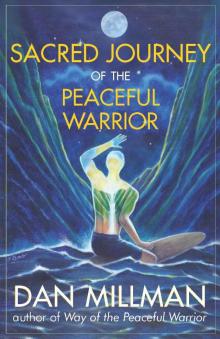 SACRED JOURNEY OF THE PEACEFUL WARRIOR
SACRED JOURNEY OF THE PEACEFUL WARRIOR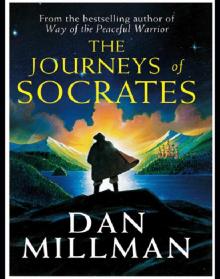 The Journeys of Socrates: An Adventure
The Journeys of Socrates: An Adventure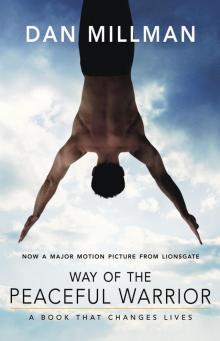 WAY OF THE PEACEFUL WARRIOR: A Book That Changes Lives
WAY OF THE PEACEFUL WARRIOR: A Book That Changes Lives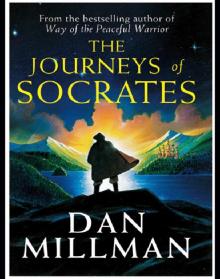 The Journeys of Socrates
The Journeys of Socrates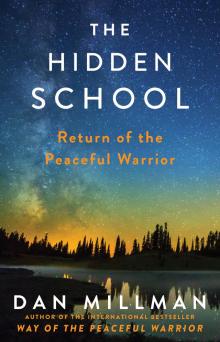 The Hidden School
The Hidden School